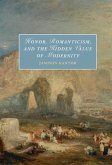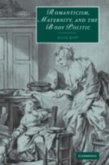This ambitious study, first published in 1999, argues that our conception of the aesthetic sphere emerged during the era of British and German Romanticism from conflicts between competing models of the liberal state and the cultural nation. The aesthetic sphere is thus centrally connected to 'aesthetic statism', which is the theoretical project of reconciling conflicts in the political sphere by appealing to the unity of the symbol. David Kaiser traces the trajectory of aesthetic statism from Schiller and Coleridge, through Arnold, Mill and Ruskin, to Adorno and Habermas. He analyses how the concept of aesthetic autonomy shifts from being a supplement to the political sphere to an end in itself; this shift lies behind the problems that contemporary literary theory has faced in its attempts to connect the aesthetic and political spheres. Finally, he suggests that we rethink the aesthetic sphere in order to regain that connection.
Dieser Download kann aus rechtlichen Gründen nur mit Rechnungsadresse in A, B, BG, CY, CZ, D, DK, EW, E, FIN, F, GR, HR, H, IRL, I, LT, L, LR, M, NL, PL, P, R, S, SLO, SK ausgeliefert werden.









